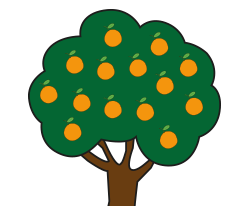We’re starting a new season more eager than ever. Thanks to the orange tree adoptions we are achieving: that 40 people can live from agriculture with fixed contracts throughout the year and be able to send the harvest directly to the people who have a tree adopted in our farm.
The tomato season has been rather difficult this year due to a mildew attack, but at last it seems that we will have a splendid citrus season. Anyone who already adopted an orange tree in our orchard can order clementines from November to December, and oranges from December to May (inclusive).
Verger de Alicia
Since we founded Naranjas del Carmen 10 years ago, we’ve learned how to convert to organic farming. During the conversion process, the yields of the orange trees decrease. However, the more the roots learn to extract nutrients naturally from the soil, the more they recover. Since we have proven this on our trees, we can confirm that with effort and patience, life in the soil gradually regenerates. Thanks to the fact that we’ve tested this process on our trees, we can safely say that with hard work and patience life in the soil is regenerating.
In May 2021, we took up a new challenge: to convert El Verger de Alicia to organic farming. It’s an orange, clementine and pomegranate tree orchard belonging to a neighbouring farmer, which until now was looked after by 72-year-old Benjamin. After a few months looking for funding, the bank granted us a loan and we signed the sale contract at the Notary Public office. We’ve already begun the transition to organic farming and we’ve convinced Benjamin to continue coming to help us. We cultivate the crops under the very same philosophy as we do in all our Naranjas del Carmen orchards.
Thanks to the acquisition of this new farm, this season we can also offer clementines and oranges to those who haven’t yet adopted a tree in our fields.
New and old challenges
There’s a new pest from South Africa that is attacking citrus fruit in Europe. It’s called the citrus mealybug and the main problem is that it deforms the oranges. It’s a huge worry because it’s devouring the fruit faster than its natural predators can keep up. We’re building two new insectariums to breed ladybirds to help us stop the spread of the mealybugs. I’ll keep you updated about the progress.
For yet another year (the third now), we’ve hardly extracted any orange blossom honey. When the bees don’t produce much honey, we prefer to give it to them so as not to debilitate the hives.
Thank you so much for being part of the family for one more season.





 My account
My account 























